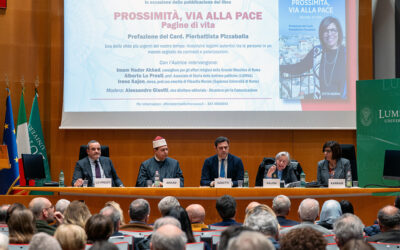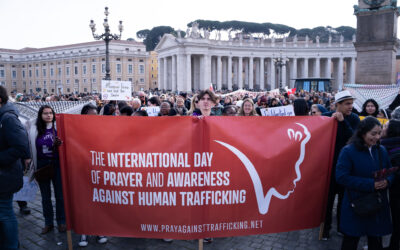 The commitment within the Constituent Assembly that would have decided the fate of post-war Italy, a commitment to peace and the support for the most needy, the commitment to ecumenism: these are some of the affinities between the two figures of Giordan and La Pira deeply linked by harmony and friendship, which were highlighted at the conference “Igino Giordani and Giorgio La Pira: virtues and politics” held on the 25th May in Florence. There were about 250 people, including some of Giordani’s family members and many young international students from the La Pira Centre, dedicated to the mayor who governed Florence from 1951 to 1964. The centre, which was entrusted by cardinal Benelli from its very inception to the Focolare Movement, has become an important place for dialogue and fraternity within the Tuscan capital city.
The commitment within the Constituent Assembly that would have decided the fate of post-war Italy, a commitment to peace and the support for the most needy, the commitment to ecumenism: these are some of the affinities between the two figures of Giordan and La Pira deeply linked by harmony and friendship, which were highlighted at the conference “Igino Giordani and Giorgio La Pira: virtues and politics” held on the 25th May in Florence. There were about 250 people, including some of Giordani’s family members and many young international students from the La Pira Centre, dedicated to the mayor who governed Florence from 1951 to 1964. The centre, which was entrusted by cardinal Benelli from its very inception to the Focolare Movement, has become an important place for dialogue and fraternity within the Tuscan capital city.
Giordani was one of the most important politicians and intellectuals of post-war Italy, but also “co-founder” of the Focolare Movement. He is known within the movement as “Foco”. He did his utmost to promote a politics based on service to the community and fraternal dialogue. “It’s an initiative that could undoubtedly appear today as daring,” said Alberto Lo Presti, president of the Igino Giordani Centre, in his speech. “Though, of course, – he continued – it wasn’t to a lesser extent during the parliamentary experience of Giordani, at the height of the cold war. What led him to such daring was the encounter with the ideal of unity of Chiara Lubich on the 17th September 1948. An ideal that Lubich gave to the world, and that Giordani knew also how to convey within politics”.
 The promotion of peace and European integration were among the cornerstones of Giordani’s parliamentary career, as analyzed by Prof. Bagnato, professor of the History of International Relations at the University of Florence: “The essence of his pacifism – he recalled – lies in his vocation to dialogue on an international level, as well as on the internal and relational one”. It’s a vocation that led the Honourable Giordani to promote numerous initiatives (such as the first bill for the objection of conscience and a parliamentary understanding to defend peace), working both with members of the party, as well as with those who were then diametrically opposed.
The promotion of peace and European integration were among the cornerstones of Giordani’s parliamentary career, as analyzed by Prof. Bagnato, professor of the History of International Relations at the University of Florence: “The essence of his pacifism – he recalled – lies in his vocation to dialogue on an international level, as well as on the internal and relational one”. It’s a vocation that led the Honourable Giordani to promote numerous initiatives (such as the first bill for the objection of conscience and a parliamentary understanding to defend peace), working both with members of the party, as well as with those who were then diametrically opposed.
The event, which saw the participation of the President of the Italian Republic, Giorgio Napolitano, opened with the greetings of the Archbishop of Florence, cardinal Betori. What followed was a succession of presentations by various scholars – from Prof. Luppi, professor of Contemporary History at the Sophia University Institute, to Prof. Monticone, historian and former national president of the Catholic Action. The event also hosted the Florence May Festival Orchestra.
At the end of the event, one of the young students present shared: “I find completely relevant and necessary, now as never before, the desire that marked Giordani’s way of understanding politics: ‘There is a need for saints in Parliament! “.




0 Comments